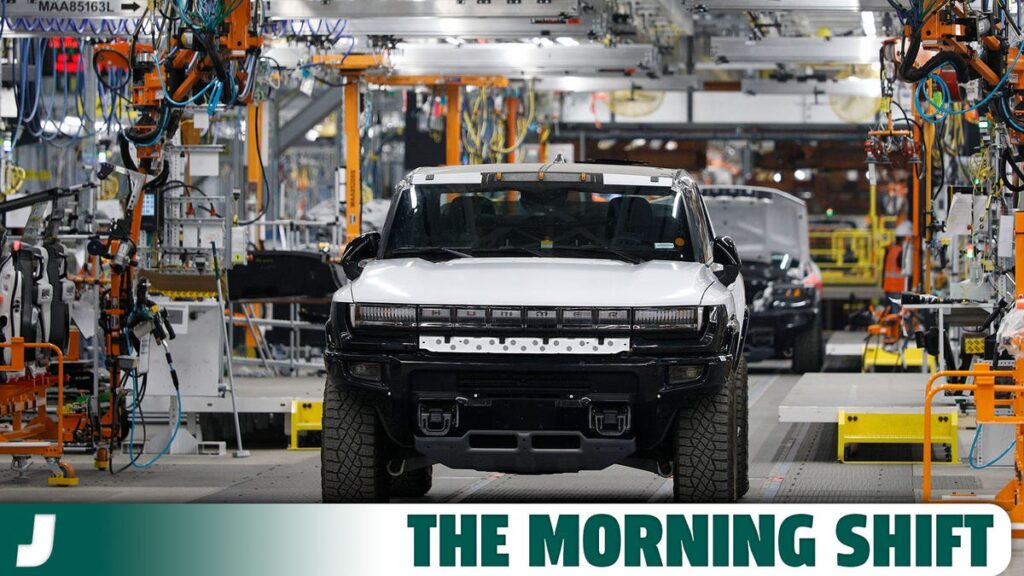Parts Shortage Idles GM’s U.S. Truck Plants

Happy Friday! It’s August 25, 2023, and this is The Morning Shift, your daily roundup of the top automotive headlines from around the world, in one place. Here are the important stories you need to know today.
A Next-Gen Bolt EV Is On The Way From Chevrolet
1st Gear: GM Slows Truck Production
When the Covid-19 pandemic hit and Russia decided to embark on an illegal war with Ukraine, the automotive supply chain got royally messed up. This meant that production slowdowns at the world’s largest automakers became commonplace for a few years while they waited on things like computer chips and wiring looms. All that appeared to be behind us for a few months, until GM announced it was slowing production at its U.S truck plants.
According to the Detroit Free Press, General Motors will halt production of several pickup models at its factories in the U.S. due to parts shortages. The production slowdown will kick off next week. The Free Press reports:
On Thursday, GM spokesman Kevin Kelly confirmed that Fort Wayne Assembly in Indiana will cancel all production the week of Aug. 28. GM makes its full-size Chevrolet Silverado and GMC Sierra light-duty pickups at Fort Wayne Assembly. Kelly said GM anticipates resuming production there on Sept. 5 after the Labor Day holiday.
Also impacted is Wentzville Assembly in Missouri, where GM makes its Chevrolet Colorado and GMC Canyon midsize pickups and the Chevrolet Express and GMC Savana vans. It will be down on third shift only for the week of Aug. 28. GM expects to restart production on third shift Sept. 5.
Despite the closures here in the U.S., GM told the site that it was set to resume production at its Mexico facilities on Monday. GM’s factory in Silao produces the Chevrolet Cheyenne and Silverado, and GMC Sierra pick-up trucks. The site south of the border has been closed for around two weeks.
2nd Gear: Hyundai Workers Vote To Strike
While all eyes have been on American auto workers at the United Auto Workers (UAW) union and its ongoing clash with the Big Three, workers at auto plants around the world have been fighting for fairer working conditions. Now, employees at Hyundai’s sites in South Korea have voted in favor of strike action.
Unionized workers have been in talks with Hyundai bosses for months over issues such as wage increases and a rise in the age of retirement at the company. However, Reuters reports that talks broke down last week and a strike vote was called. The site reports:
The union, one of the biggest in the country with about 44,000 members, said 88.93% of its members had approved strike action unless the company accepted the demands.
A strike would mark the first such action in five years related to wage negotiations at the South Korean carmaker and could disrupt delivery of some popular vehicles, which Hyundai has been struggling to ramp up due to prolonged component shortages.
Union officials told Reuters that it would continue working on negotiations with management from the automaker. It is currently fighting for an increase in basic monthly of 184,900 won ($139) and performance-based pay that equates to around 30 percent of Hyundai’s 2022 net profit. The union also wants to increase the retirement age from 60 up to 64.
3rd Gear: Battery Plant Workers Get That Raise
There is some good news this week, though, and that’s that workers at GM’s battery plant have secured the raises they’ve been hoping for. According to Automotive News, workers at the company’s battery site in Ohio were fighting to raise their wages from “as little as $16 an hour.”
Automotive News reports that workers at the Ultium Cells facility in Ohio, which is a joint venture between General Motors and LG Energy Solution, have been awarded pay rises of 25 percent on average. According to the site:
Ultium Cells, a joint venture of General Motors and LG Energy Solution, said workers must still ratify the interim wage increase that takes effect Aug. 28. The UAW said the increase is worth $3 to $4 an hour for workers.
The interim wage increase will be retroactive to December 2022 and some workers will receive between $3,000 to $7,000, based on hours worked.
“Providing this wage increase is the right thing to do for our team members,” Ultium said.
The site came under fire for its low wages earlier this year, when Democratic senators and the UAW criticized Ultium for its low pay. In some instances, workers at the site were making “just half as much” as employees had been taking home at a nearby GM assembly plant, which closed down.
4th Gear: U.S. Auto Sales On The Rise
As another month draws to a close, it’s time to look back on all the cars sold across the U.S. in August, and it looks to have been a bumper month for new car sales. According to a report from Reuters, consumers across America spent an eye-watering $47.8 billion on new vehicles last month.
That sky high figure, which is roughly the same as the GDP of Latvia, marks a ten percent increase in spending over the same period last year and, when it comes to the number of new cars sold, that figure is more than 15 percent higher than the same period in 2022. As Reuters reports:
U.S. new vehicle sales, including retail and non-retail transactions, are estimated to reach 1,354,600 units in August, a 15.4% jump from a year earlier, according to the joint report by J.D. Power and GlobalData.
“Retailers continue to sell vehicles before they physically arrive at the dealership. However, with increased inventory levels, more shoppers are now able to purchase vehicles from dealer lots,” Thomas King, president of the data and analytics division at J.D. Power, said in a statement.
Retail inventories could see a 48.4% jump in August over the year earlier. Inventory pile-up, however, might lead to a decline in dealers’ profit, which also faces pressure from elevated interest rates.
One interesting stat that comes from the August sales results is that transaction prices actually dropped by 1.2 percent last month. Reuters suggests this is due to a move towards smaller vehicle segments during the past month.





